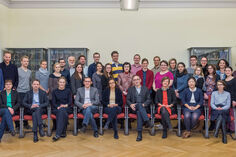
Cognitive Neuropsychiatry Section
The “Cognitive Neuropsychiatry” section’s research agenda is located at the intersection of psychopathology, cognition and systems neuroscience. A comprehensive set of clinical, psychometric and neurocognitive methods together with advanced multimodal imaging techniques and data analysis strategies are used to develop and refine neurobiological models of mental health and disease. Particular emphasis is placed on dimensional, transdiagnostic and translational research in neuropsychiatric disorders, especially in schizophrenia and neurodegenerative movement disorders with high risk for comorbid psychosis (e.g. Huntington’s and Parkinson’s disease). Previous and most recent systems neuroscience research in schizophrenia and related-spectrum disorders include investigations of executive, memory and sensorimotor system dysfunction, development and persistence of positive symptoms (psychotic-like experiences, delusions and hallucinations), treatment-resistance and treatment-response to pharmacological interventions or non-invasive brain stimulation.
The internationally acknowledged multimodal neuroimaging expertise encompasses the full spectrum of structural and functional MRI imaging protocols and subsequent data analysis streams, including voxel-, surface- and source-based morphometry, DTI and resting-state (CASL and BOLD) and task-based imaging. Data analysis expertise essentially advanced analytic approaches and neuroinformatics tools applied to leverage multimodal neuroimaging and omics data, particularly predictive algorithms and multivariate (big) data analysis strategies for multimodal imaging data sets. Special emphasis is laid on data fusion methods designed to extract cross-modally shared and modality-unique information on neural network integrity and plasticity. Method development and implementation in transdiagnostic and translational settings is supported by long-standing collaborations with Prof. Fabio Sambataro (Padua University) and Prof. Vince Calhoun (previously affiliated to MRN, Albuquerque, now director of TReNDS at Georgia State, Georgia Tech and Emory University).




